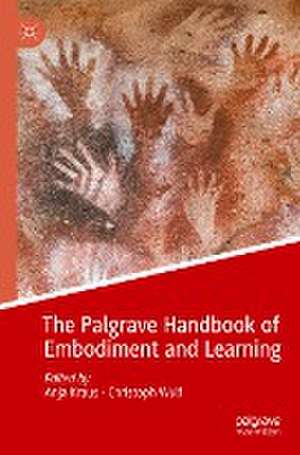The Palgrave Handbook of Embodiment and Learning
Editat de Anja Kraus, Christoph Wulfen Limba Engleză Paperback – 7 dec 2023
| Toate formatele și edițiile | Preț | Express |
|---|---|---|
| Paperback (1) | 1398.24 lei 6-8 săpt. | |
| Springer International Publishing – 7 dec 2023 | 1398.24 lei 6-8 săpt. | |
| Hardback (1) | 1403.45 lei 6-8 săpt. | |
| Springer International Publishing – 7 dec 2022 | 1403.45 lei 6-8 săpt. |
Preț: 1398.24 lei
Preț vechi: 1705.17 lei
-18% Nou
Puncte Express: 2097
Preț estimativ în valută:
267.59€ • 276.43$ • 222.70£
267.59€ • 276.43$ • 222.70£
Carte tipărită la comandă
Livrare economică 25 martie-08 aprilie
Preluare comenzi: 021 569.72.76
Specificații
ISBN-13: 9783030930035
ISBN-10: 3030930033
Pagini: 598
Ilustrații: XXI, 598 p. 25 illus.
Dimensiuni: 155 x 235 mm
Greutate: 0.94 kg
Ediția:1st ed. 2022
Editura: Springer International Publishing
Colecția Palgrave Macmillan
Locul publicării:Cham, Switzerland
ISBN-10: 3030930033
Pagini: 598
Ilustrații: XXI, 598 p. 25 illus.
Dimensiuni: 155 x 235 mm
Greutate: 0.94 kg
Ediția:1st ed. 2022
Editura: Springer International Publishing
Colecția Palgrave Macmillan
Locul publicării:Cham, Switzerland
Cuprins
Introduction.- I Philosophical and Historical Underpinnings.- Promoting Embodiment Through Education in the Anthropocene.- Embodiment Through Mimetic Learning.- Awareness as a Challenge. Learning Through our Bodies on a Planet in Crisis.- Building Blocks of a Historical Overview of ‛Tacit Knowledge’.- The Antinomies of Pedagogy and Aporias of Embodiment. A Historical and Phenomenological Investigation.- Embodied Cognition: A Methodological and Pedagogical Interpretation.- II The Pedagogical Relationship and Professionalism.- Knowledge of Pathos.- Pedagogical Tact. Reconstruction of a Bodily Moment of the Pedagogical Relationship.- Gestures in the Classroom.- Vulnerability – a Basic Concept of Pedagogical Anthropology.- Pedagogical Educational Relationships as Relationships of Power.- III Body, Sociality and Learning.- The Performativity of Learning.- The Embodied Other: Mimetic-Empathic Encorporations.- The Embodiment of Gender in Childhood.- The Adult-Child Co-Existence: Asymmetry, Emotions, Upbringing.- Alterity and Emotions - Heterogeneous Learning Conditions and Embodiment.- IV Body, Space and Learning.- Movement and Touch: Why Bodies Matter.- Like Water Between One’s Hands - Embodiment of Time and the Ephemeral of Dance.- Materiality and Spatiality of Bodily Learning.- Body-Related Learning Processes in Museums.- V Body, Virtual Reality and Mindfulness.- Technical Mediation of Children’s Onlife Worlds.- Creative and Artistic Learning in Post-Digital Youth Culture: Results of a Qualitative Study on Transformations of Aesthetic Practices.- Mind the Body – Mindfulness Meditation as a Spiritual Practice between Neuroscience, Therapy and Self-Awareness.- VI Classroom Practices.- The Role of Bodily Experience for Learning Designs.- Mathematics Learning: Structured Ways of Moving With.- Social Choreographies in Primary School Education.- On the (In)Visibility of Postcolonial Subjectivation - Educational Videography Research in Glocalised Classrooms.- Music as an Embodied Learning Experience.- VI Bodies in Times of Glocalizations.- Embodiment of the Values System in Indigenous African Society.- Embodiment in Education in the Islamic World.- The Body in Education: Conceptions and Dimensions in Brazil and Latin America.- Cultivating a Gentle Body: A Chinese Perspective.- The Body and the Possibility of an Ethical Experience of Education: A Perspective from South Asia.
Notă biografică
Anja Kraus is Professor of Arts and Culture Education at Stockholm University, Sweden. Her research focuses on corporeality in educational contexts; phenomenological, ethnographical and theoretical research on practices and arts education amongst other topics, and she has published widely in these areas.
Christoph Wulf is Professor of Anthropology and Education and a member of the Interdisciplinary Centre for Historical Anthropology, the Collaborative Research Centre (SFB, 1999-2012) “Cultures of Performance,” the Cluster of Excellence (2007-2012) “Languages of Emotion,” and the Graduate School “InterArts” (2006-2015) at the Freie Universität Berlin. His books have been translated into 20 languages. For his research in anthropology and anthropology of education, he received the title “professor honoris causa” from the University of Bucharest and the honorary membership of the German Society of Educational Research. He is Vice-President of the German Commission for UNESCO.
Christoph Wulf is Professor of Anthropology and Education and a member of the Interdisciplinary Centre for Historical Anthropology, the Collaborative Research Centre (SFB, 1999-2012) “Cultures of Performance,” the Cluster of Excellence (2007-2012) “Languages of Emotion,” and the Graduate School “InterArts” (2006-2015) at the Freie Universität Berlin. His books have been translated into 20 languages. For his research in anthropology and anthropology of education, he received the title “professor honoris causa” from the University of Bucharest and the honorary membership of the German Society of Educational Research. He is Vice-President of the German Commission for UNESCO.
Textul de pe ultima copertă
This handbook provides an important overview of corporeality, embodiment and learning in education from both theoretical and empirical perspectives. Situating the body at the centre of educational practice, the editors and contributors introduce the concept of ‘tact’ as a practical corporeal language. The chapters provide a spectrum of historical, conceptual, empirical and practical educational approaches for embodied pedagogical engagement. Tact and embodied knowledge form a significant component of a teacher’s capability and professionalism: interacting with students, a pedagogue responds to them tactfully, emotionally, sensitively, and reflectively searching for the right thing to do, the right words to say, improvising in aural, linguistic, spatial, and visual way that are as restrained as they are enabled by the body. This handbook questions the familiar and established essentialist and naturalist view of the body to allow new perspectives on how corporeality affects learners. It will be of interest to scholars in education and philosophy as well as those researching in across social sciences.
Caracteristici
Draws on an international selection of contributors to understand embodied pedagogical engagement
Highlights the range of pedagogical relationships and interactions that can inhibit or encourage learning
Opens up the concept of ‘tact’ for a wider audience
Highlights the range of pedagogical relationships and interactions that can inhibit or encourage learning
Opens up the concept of ‘tact’ for a wider audience
